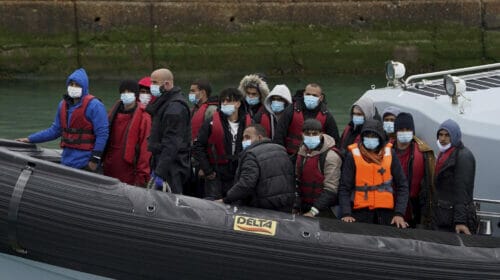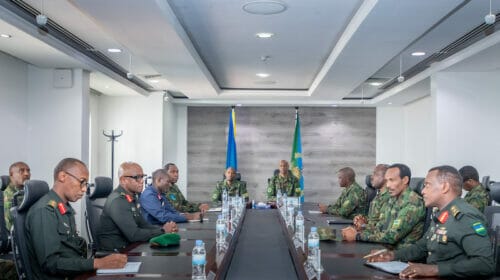GETTING RID OF THE RPF SECTARIAN ADMINISTRATION, A PRE-REQUISITE FOR STABILITY
 By: Jean-Baptiste Mberabahizi
By: Jean-Baptiste Mberabahizi
” Leaked cables from the US Embassy in Kigali posted by the renowned whistleblower website Wikileaks confirmed last week what every Rwandan knows since July 1994 : that the Rwandese Patriotic Front government is dominated by a tiny minority of (English speaking) Tutsis in a country where 85% of the population are Hutus or Rwandans from mixed ethnic descent.”
The man who authored the cable is the US Ambassador to Rwanda Michael Arietti. Had Mr Arietti been a Rwandan, he would have been thrown in jail for propagation of « genocide ideology » and « ethnic divisionism ». What spared him from the brutality of Paul Kagame’s minority dictatorship, as his former General Prosecutor Gerald Gahima calls it, is that he was heading the diplomatic mission of the all mighty US Empire, the land of Paul Kagame’s masters and first bilateral bankrollers.
And he’s paid back since President Obama recently used his constitutional powers to block a civil lawsuit filed against him in Oklahoma for his responsibility in the assassination of the Hutu Presidents of Rwanda and Burundi that triggered the infamous 1994 Tutsi genocide.
Mr. Arietti pointed his fingers at the ethnic composition of the three branches of the RPF government noting that Hutus are very few and adding rightly that when they hold any senior position they are always twinned with Tutsi officials who are the real depositors of constitutional authority. In a previous article we also showed how sectarian the army, police and intelligence services are. This time we would like to check the local administration which, as everybody knows, deals with the Rwandan population on daily basis.
The head of Rwandan local administration is none else than the powerful minister of local administration James Musoni. He was so far officially seconded by the Secretary of State for Rural and Social Development late Christine Nyatanyi who had no real authority and was there for public relations purposes.
Then we have four Governors whose real powers are very limited. It’s even planned to scrap that level whose effectiveness is described by RPF leaders themselves as redundant. The only purpose of their creation was guided by a divide and rule agenda. That of dividing Hutus across regional cleavages. Hutus from the South (Gitarama, Butare and Gikongoro) were regrouped in the South Province while those from the North were split into two parts. Those from Gisenyi were merged with Hutus from Cyangugu and Kibuye to form the Western Province while those from Ruhengeri and Byumba were regrouped into the Northern Province. The RPF policies since then are directed at fuelling division and resentment against Hutus from Gisenyi, the stronghold of the previous regime, with the intention of isolating them.
A new level of district was created with 30 districts, to which you add the three districts of Kigali City. Even though district mayors are indirectly elected, candidates are always vetted by the RPF secretariat upon positive intelligence biographic and political reports about every candidate. At the end of the day, only candidates expected by the RPF are elected. But, it’s at the sector level that this deliberate sectarian policy is best unmasked. There are 416 sector executive secretaries in charge of all local executive powers across the country. Elected sector councils have absolutely no power. Sector executive secretaries are appointed by the minister of local administration. All of them are RPF trained cadres. They are not responsible before the elected councils and report exclusively to the central government. They are regularly summoned to Kigali for political indoctrination through ideological courses called « Itorero ry’Igihugu ». Last month, they received inducements from the central government in form of official vehicles at the closing ceremony of the last indoctrination course, a move meant to buy their loyalty.
Most of them are Tutsis. They don’t have to be born or even reside in their area of duty before appointment. They are deployed just like policemen and soldiers where the duty calls them. The local population sees them with defiance but doesn’t say anything for fear of retaliation. They are the symbol and the most powerful manifestation of both the RPF might and alien character towards the local population. They receive a paramilitary training and it’s believed their also keep at home light weapons for the purpose of self-defense since they consider the local population as potentially hostile. This nationwide network of political cadres is the one that conducts daily political indoctrination of citizens especially during political campaigns and enforces RPF up-bottom policies. They usually compile regular political intelligence reports and channel them to relevant higher authorities.
This trend is a dangerous regression. Even though the previous regime was not a democracy, local leaders at sector level were directly elected by citizens. At the « commune » level, they were all appointed by the President of the Republic himself and would report to him. They were the real depositors of executive powers but they were fewer than today. And of course, all but a few were Hutus. However, the current regime has worsened that tendency.
The 416 sector executive secretaries remind Rwandans of the infamous sub-chiefs of the Belgian feudal-colonial era. In their collective memory, this situation undoubtedly bears a dangerous and very negative symbolic charge that pulls the Rwandan society towards the conditions that created anger, resentment and legitimate feelings of exclusion and oppression from the Hutu community that led to the 1959 peasant revolution.
The UDF-Inkingi has to address this historical problem once for all. Depositors of the executive or the representative powers at all local levels should be directly elected by citizens through regular, free and fair local elections as it’s the rule in any democratic political system. Political positions should be separated from administrative positions and the central and local administrations should be non-partisan, non-sectarian and non-sexist. The current RPF sectarian administration has to be deeply reformed if Rwanda wants to suppress the conditions that rendered the genocide and the counter-genocide possible in order to achieve a lasting social stability.


